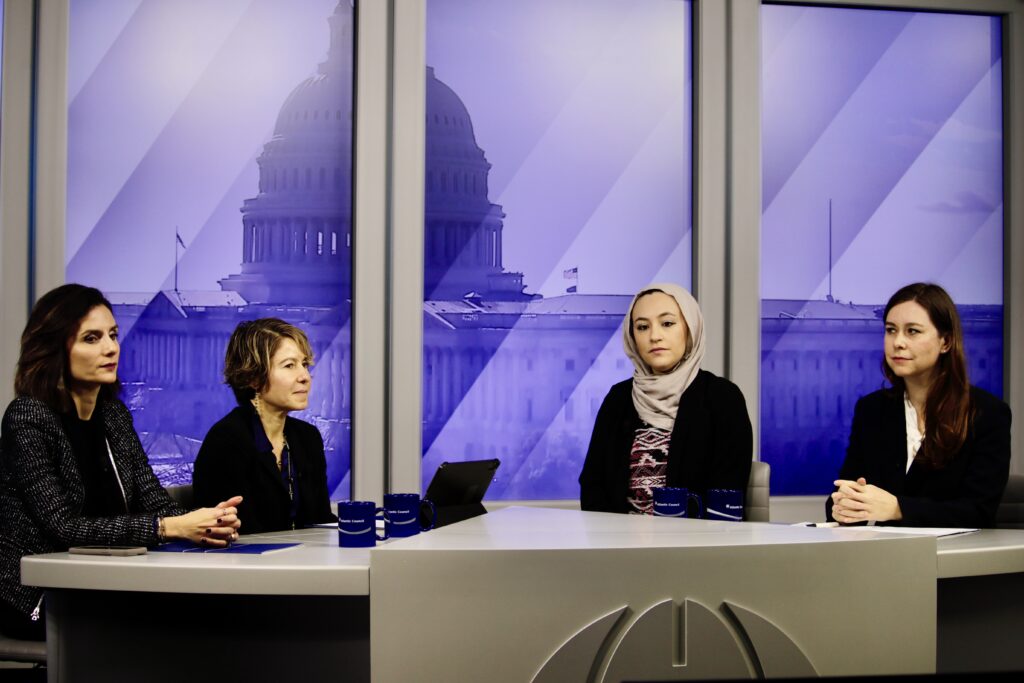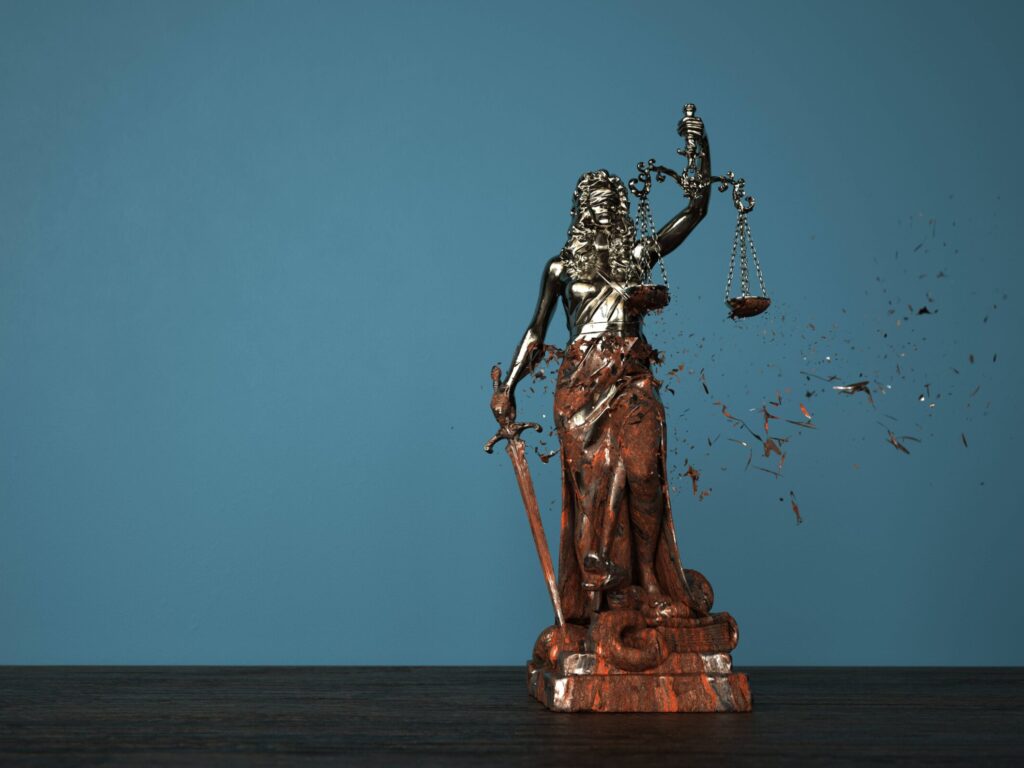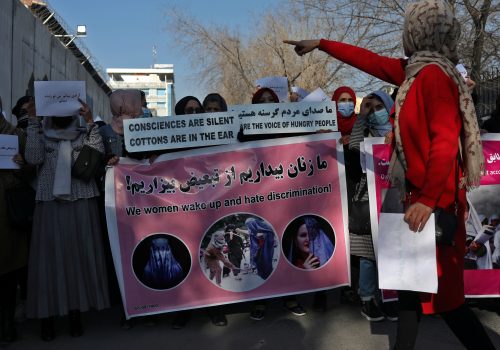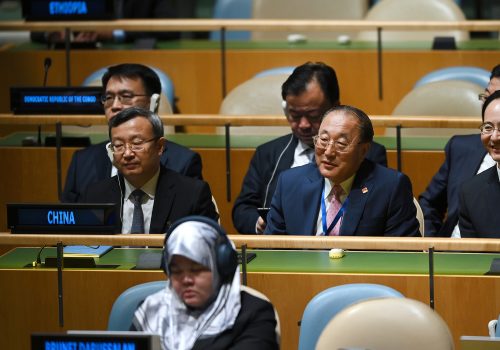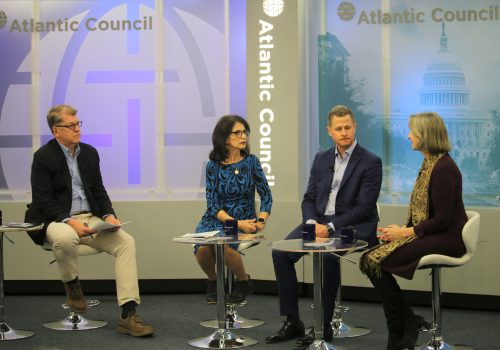Watch the event
On Wednesday, February 14, the Atlantic Council’s Strategic Litigation Project hosted a hybrid panel event about the crucial role women and their testimonies play in pursuit of justice and accountability in the Middle East and North Africa (MENA).
The panel discussion featured Dalal Mawad, award-winning Lebanese journalist and author of All She Lost: The Explosion in Lebanon, the Collapse of a Nation and the Women who Survive; Mai El-Sadany, executive director of the Tahrir Institute for Middle East Policy; and Haydee Dijkstal, an international human rights lawyer and nonresident senior fellow with the Strategic Litigation Project.
Moderator Patricia Karam, a nonresident senior fellow at Arab Center Washington DC, set the tone for the panel with her opening remarks, which outlined the political, economic, and social challenges women still face in MENA despite some discrete attempts at reform. Karam highlighted the heightened violence against women during periods of instability, pointing to current situations in Afghanistan, Libya, and Syria. She also noted the insecurity that women face under authoritarian regimes generally, highlighting the Islamic Republic of Iran’s violent crackdowns on protests following the death of Mahsa Jina Amini.
Elevating voices and confronting injustice
Dalal Mawad began the panel discussion by explaining her two primary motivations for writing All She Lost. First, she wanted to provide a space for women to tell unique histories from their own perspectives. So often in the Middle East, women lack a safe space to share their experiences, but, Mawad explained, that once they find this space, women become powerful storytellers. Second, she wanted to challenge the culture of impunity in Lebanon. After the Beirut blast, Mawad realized that generations of Lebanese women, having lived through decades of economic crises and war, had never been given the opportunity to process and come to terms with their experiences by documenting their stories.
Mawad elaborated on this system of injustice, explaining how Lebanon’s legal system compounds trauma for women victims of tragedies like the Beirut blast. She shared stories from interviews that she had conducted for the book, including one about a woman who is still struggling to gain custody for her two children after her husband died in the blast due to the court’s mandate for a male custodian.
Holding institutions accountable
Mai El-Sadany delved into possible responses to gender-based violence. She began by explaining the multifaceted nature of these abuses, occurring across the region both online and offline, in conflict and in peacetime, at the hands of both individuals and state actors. Each of these dynamics pose unique challenges for activists, and ideally states, to address. El-Sadany also expressed some hope, citing the widespread reaction to a spate of femicides in Egypt, which prompted many women to organize and propose new solutions. This action demonstrated the important efforts by feminist organizations in MENA to tackle gender-based crimes, moving their ideas toward the mainstream and recruiting men to act as allies.
Haydee Dijkstal then discussed the role of journalists in accountability, explaining that the media can contribute to systems of justice in two major ways. First, journalists cover events as they unfold, often bearing witness to and documenting crimes in the process. This evidence is vital for investigators, who can only begin collecting evidence after a crime has already occurred, making the task of establishing an accurate narrative difficult without the help of journalists. Second, reporting helps to keep the justice system accountable. The media can demand answers from governments and courts and serve as a bullwork against corrupt officials and institutions.
The truth as a legal remedy
Reparations are a crucial form of redress for victims, but, Dijkstal explained, the challenge in obtaining them is the legal process’ order of operations. At the International Criminal Court (ICC), for example, several avenues exist for reparations, but these options are only available after convictions and the establishment of the scope of harm and affected victims. Even reaching this point is difficult, as charges against perpetrators often take years to bring, sometimes long after the alleged crimes were committed. Dijkstal suggested reframing the notion of reparations to fulfill a broader range of victims’ needs, including their right to the truth. This form of reparations could come earlier in the legal process through fact-finding efforts.
Karam connected this need for truth to the context of the Lebanese Civil War. She said that Lebanese society has dealt with the conflict through a collective amnesia, contributing to the current culture of impunity among political elites in the country. Mawad added that the truce at the level of warlords and politicians has provided amnesty for the war’s perpetrators. Likewise, no official narrative exists for the blast. The initial investigation has stalled because corrupt officials blocked the investigating judge at every step. The lack of government fact-finding efforts elevates the importance of an independent media.
The intersection of conflict and gender
El-Sadany then spoke about the position of women during times of conflict. Abuses against women in conflict zones fall largely into two categories: gender-based and compounded harms. Gender-based or sexual crimes often occur in order to specifically harm women, as is the case with the reported increase in sexual violence in the civil war in Sudan. Compounded harms arise as the result of simply being a woman in the context of conflict. This dynamic is currently at play in Gaza, where women have difficulty finding sanitary pads and are experiencing disproportionate harm during pregnancy. These conflicts make headlines, but all too often, women’s experiences do not. El-Sadany underscored the importance of women journalists and advocates to change this reality.
Dijkstal applied this understanding to refugees and stateless persons. Conflict, statelessness or refugee status can amplify women’s hardships. Refugee women are more likely to face education deprivation, poverty, and lower access to work. Dijkstal explained that protection mechanisms exist at the international level, but they need to be reinforced by state signatories. Many states in the region are party to the Convention on the Elimination of All Forms of Discrimination against Women and the International Covenant on Civil and Political Rights, for example, but these laws lack practical tools for enforcement. Dijkstal prescribed international pressure to incentivize states to bring their domestic policies in line with international human rights standards.
The path forward
Mawad noted that United Nations fact-finding missions can be a powerful tool in uncovering the truth and securing justice for women, but also noted that this process can be complicated by abstention of countries in calling for these investigations. This was the case for example when the United States failed to sign a joint letter calling for a fact-finding mission into the Beirut blast. If the United States put its weight behind such measures and lobbied allied countries to do the same, an investigation would come more swiftly.
Where possible, El-Sadany recommended pursuing legal battles domestically, highlighting the reemergence of universal jurisdiction cases as a promising development since under domestic universal jurisdiction frameworks, human rights abuses can be heard in national courts regardless of the crime’s location.
Dijkstal pointed to the international legal system as a possible bright spot in tackling gender-based offenses. Most notably, the ICC’s Office of the Prosecutor recently released a report detailing its policy on gender-based crimes. The Office urged addressing gendered aspects to international abuses at earlier stages in prosecution to ensure a higher success rate and speedier process to convict perpetrators.
In conclusion, all three panelists emphasized the need for strengthened local approaches. Women’s and victims’ groups in the MENA region are already tackling these issues directly. The international community can aid in these grassroots initiatives through providing vital monetary, legal, and journalistic support. Enhancing civil society plays a critical role in constructing social and political attitudes that can have the greatest long-term effect on women’s experiences.
Charles Johnson is a Young Global Professional with the Middle East Programs at the Atlantic Council.
Further reading
Fri, Dec 15, 2023
Strategic Litigation Quarterly Newsletter: Pursuing gender justice through international law
Strategic Litigation By
The SLP team has continued and built upon efforts to codify the crime of gender apartheid in international law, including by advocating for its inclusion in the UN Sixth Committee’s draft crimes against humanity treaty.
Mon, Sep 25, 2023
China’s ‘crimes against humanity’ targeting Uyghurs aren’t going away. Here’s what the international community can do.
New Atlanticist By
Don't be fooled by China's efforts to cover up its oppression of the Uyghur people and other Turkic minorities, human-rights experts warned.
Fri, Mar 17, 2023
Prioritizing response and recovery for US persons wrongfully detained abroad
Event Recap By
On February 15, the Atlantic Council’s Strategic Litigation Project held a discussion about the United States’ approach to cases of wrongful detentions abroad, how strategies can be improved, and ways to better support the families of those detained.
